Rounds with the MGVP Regional Veterinary Team
By Gorilla Doctors Staff on Tuesday, July 13th, 2010 in Uncategorized.Each month all Gorilla Doctors gather in Ruhengeri at our regional office for “veterinary rounds.” We also invite Dr. Arthur, the ICCN veterinarian for Virunga National Park in Congo, Dr. Cyprian, our volunteer veterinarian who is helping with our domestic animals cases, and Elisabeth, the Volcanoes Nation Park Veterinary Warden and our dear partner in Rwanda. We meet to discuss cases, specific gorilla medicine subjects, and in general share our experiences and learn from each other. We have such a great team, and each time we get together I am reminded of what a devoted, knowledgeable and hard working group of veterinarians and professionals I am privileged to work with.
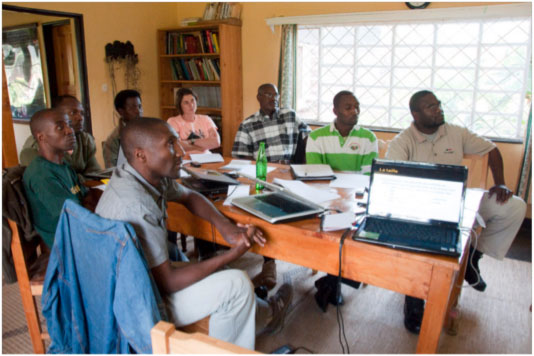 From left to right around the table: Dr. Eddy, Dr. Fred, Dr. Julius, Elisabeth, Dr. Magda, Dr. Jacques, Dr. Cyprian and Dr. Arthur.
From left to right around the table: Dr. Eddy, Dr. Fred, Dr. Julius, Elisabeth, Dr. Magda, Dr. Jacques, Dr. Cyprian and Dr. Arthur.
This month we had several interesting and sometimes difficult cases to discuss. Dr. Magdalena and Dr. Fred had a difficult case with the tiny twin gorilla baby in Bwindi who died shortly after she was found. She was much smaller than her twin, and the suspicion is that the mother could not provide enough milk for both babies to grow well. There was Mukunda, the silverback in DRC who had been out of the forest for almost 2 weeks when Dr. Eddy, Dr. Arthur and I anesthetized him to move him back to the forest – a case with medical and political issues that were good for us to discuss as a team. And of course the Pablo group tragedies of last month. We debrief, discuss all medical and political aspects of each case. We try to learn as much as we can from each situation to apply to the next similar case. This is also a part of capacity building for our regional veterinarians. In addition we try to send each veterinarian to an intensive continuing education experience each year.
Each “rounds” we also discuss a specific subject, and this month we talked about anti-inflammatory drugs – you know, ibuprofen and the like. Probably sounds pretty boring, but it is a great learning opportunity for us to discuss in depth the drugs that we use, so that we always use them wisely! This month JP also gave us a lesson on calibrating our microscopes so that we can accurately measure cells and parasites. I learned a lot from him that day.
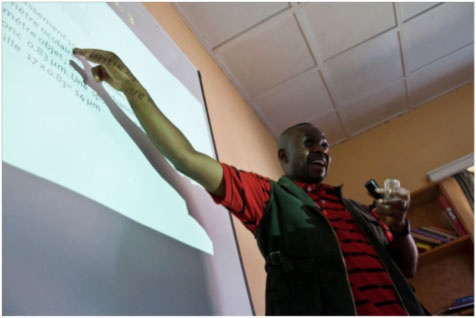 JP during the lecture portion of his presentation
JP during the lecture portion of his presentation
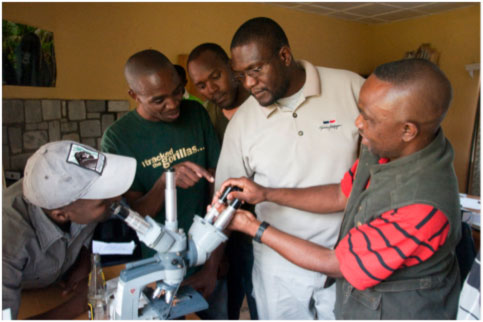 Dr. Eddy looking in the microscope, with Dr. Fred, Dr. Julius, Dr. Arthur, and JP the teacher.You can read the biographies of each of our Gorilla Doctors on the website, but let me tell you a bit more about each of these incredibly dedicated people.
Dr. Eddy looking in the microscope, with Dr. Fred, Dr. Julius, Dr. Arthur, and JP the teacher.You can read the biographies of each of our Gorilla Doctors on the website, but let me tell you a bit more about each of these incredibly dedicated people.
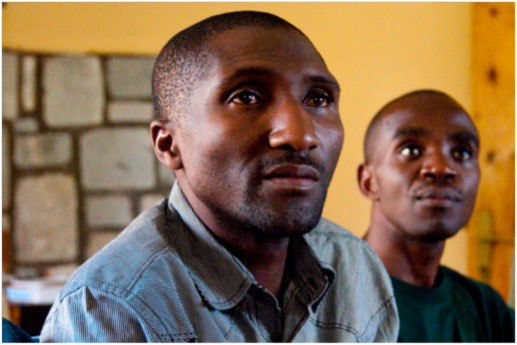 Dr. Eddy and Dr. Fred listening intentlyDr. Eddy and Dr. Jacqes are our Field Veterinarians in the Democratic Republic of Congo. They are some of the bravest people I know. Remember that Dr. Eddy went to Walikali to confiscate little Njingala, even though it was a “red zone” at the time. Things are beginning to stabilize in Congo where we work, but Drs. Eddy and Jacques must always be alert to rebel activities. Dr. Jacques is our “fixer” in Congo – he can help make almost anything happen when we need it! They currently work with one truck between them, with little complaint – we are working on acquiring another, but funds are limited at the moment!
Dr. Eddy and Dr. Fred listening intentlyDr. Eddy and Dr. Jacqes are our Field Veterinarians in the Democratic Republic of Congo. They are some of the bravest people I know. Remember that Dr. Eddy went to Walikali to confiscate little Njingala, even though it was a “red zone” at the time. Things are beginning to stabilize in Congo where we work, but Drs. Eddy and Jacques must always be alert to rebel activities. Dr. Jacques is our “fixer” in Congo – he can help make almost anything happen when we need it! They currently work with one truck between them, with little complaint – we are working on acquiring another, but funds are limited at the moment!
Dr. Fred is our newest Field Veterinarian, working in Uganda. He came to us with considerable experience with chimpanzees and is working hard to learn all of the habituated gorilla groups in Bwindi! We are trying to secure a microscope for his field station in Bwindi so he can run some simple tests there rather than having to run samples to Kampala or Ruhengeri.
Dr. Julius is our newest Gorilla Doctor. He is setting up an office in Kigali and is the Rwanda Country Coordinator for a program called Predict. He will be coordinating very important work investigating zoonotic diseases in the country (diseases that can move between animals and people). Dr. Julius also comes to us with chimpanzee experience, but will now gain experience with many species as he investigates diseases.
Elisabeth has been working as a veterinary technician with mountain gorillas for over 20 years. Her experience and wisdom make her an invaluable partner to MGVP, and we lean on her when we are making difficult field decisions. She is not only our partner, but a good friend to each of us.
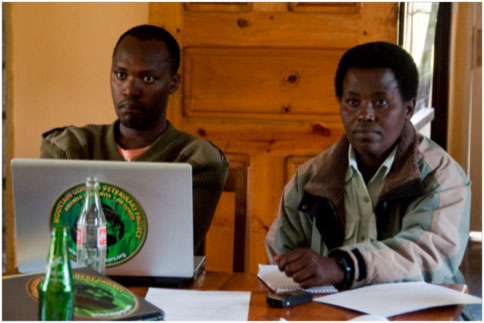 Dr. Julius and Elisabeth listening soaking up the information JP was presenting!Jean Paul (JP) is the manager of our Employee Health Program. He works so very hard to be sure all trackers, guides and rangers have their annual physical examinations, receive their results, receive treatment, etc. He also compiles all results and reports and works with doctors and hospitals in all 3 countries. In addition is the lab manager when he is in the office, and is our resident microbiologist. He just returned from an intensive course in primate parasitology in Germany, and will be presenting what he learned there at our next rounds!
Dr. Julius and Elisabeth listening soaking up the information JP was presenting!Jean Paul (JP) is the manager of our Employee Health Program. He works so very hard to be sure all trackers, guides and rangers have their annual physical examinations, receive their results, receive treatment, etc. He also compiles all results and reports and works with doctors and hospitals in all 3 countries. In addition is the lab manager when he is in the office, and is our resident microbiologist. He just returned from an intensive course in primate parasitology in Germany, and will be presenting what he learned there at our next rounds!
Dr. Noel joined us last October as a laboratory technician. He recently received his veterinary degree from ISAE and did his final project looking at parasites in cows around the park. He is hard working, dedicated to learning, and loves working in the lab. We hope to send him to the United States for intensive labwork experience sometime this year once we raise the airfare.
Dr. Magdalena is our Regional Field Veterinarian, and she stands ready to work in all 3 countries if and when needed. She has the most experience in our regional team on management of respiratory diseases, and works a lot with the confiscated orphan gorillas in Kinigi. Like Fred and Julius, she absolutely adores chimps, but we do not hold that against any of them!
Not present at rounds this month were Dr. Jean Felix, who is pursuing masters in Public Health in Kigali at the moment, Dr. Benard, who is the Uganda Country Coordinator, and Drs. Mike and Kirsten, our fearless and dedicated leaders who work non-stop behind the scenes to keep us on track!
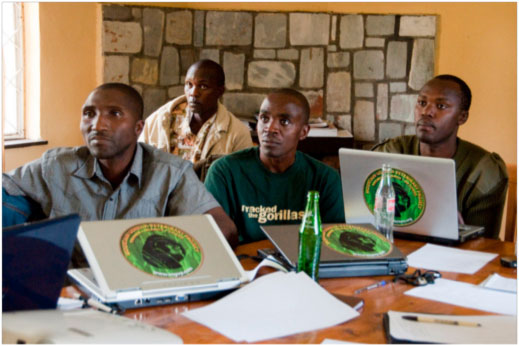 Dr. Eddy, Dr. Noel, Dr. Fred and Dr. Julius.
Dr. Eddy, Dr. Noel, Dr. Fred and Dr. Julius.
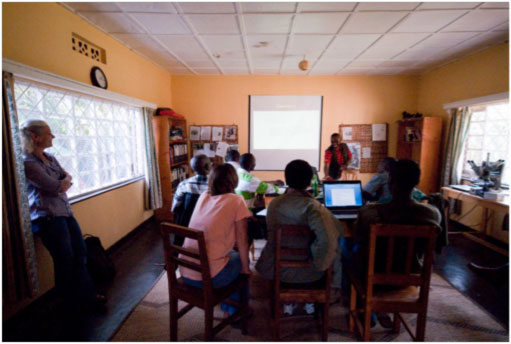
The days we have our monthly veterinary rounds are long, but we always try to end with dart practice for fun. We use a banana tree in the back yard as our target – he’s still alive, although a bit tattered, especially around the “bull’s eye”!
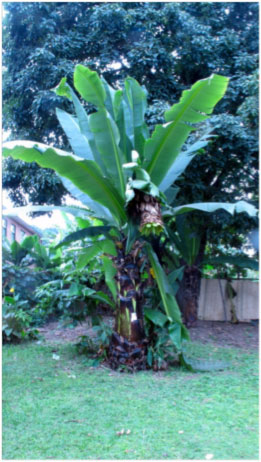 Still going strong after many target practices!We are a team of veterinarians and professionals working toward the same goal – gorilla health and conservation. We do that by direct gorilla care, human health care, domestic animal health care. One Health.
Still going strong after many target practices!We are a team of veterinarians and professionals working toward the same goal – gorilla health and conservation. We do that by direct gorilla care, human health care, domestic animal health care. One Health.



 Donate
Donate